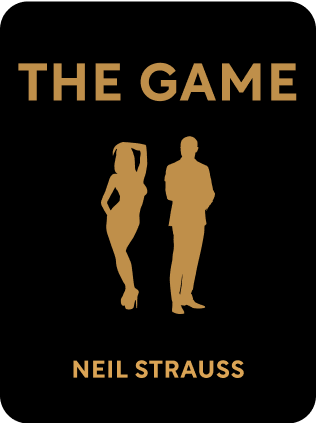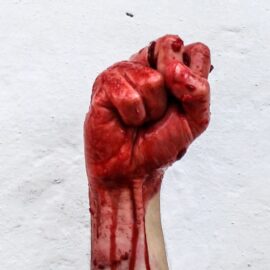

This article is an excerpt from the Shortform summary of "The Game" by Neil Strauss. Shortform has the world's best summaries of books you should be reading.
Like this article? Sign up for a free trial here .
What was project Hollywood, and how was Style involved? Did Style leave Project Hollywood?
Project Hollywood was a business venture started by several PUAs, including Style. Eventually, the environment at Project Hollywood became too volatile, and caused Style to exit the PUA community.
Launching Project Hollywood
Style began to realize that he’d been focusing too much on memorizing pickup routines and simply picking up women at clubs. He now saw that the real purpose of the game was in creating a lifestyle that was interesting, exciting, and fulfilling. Men with that lifestyle exuded confidence and vibrancy that naturally attracted women.
Style was ready to graduate from sarging and build this lifestyle. He decided it was time for him and Mystery to create Project Hollywood, which would be a seduction headquarters.
Style and Mystery found a mansion in Hollywood—Dean Martin’s former home—and they planned to use it as a home base for PUAs, a venue for parties and seminars, and a meeting place for Mystery’s workshops. Since they didn’t want to take on the risk of putting their names on the lease for a massive party house, they got Papa to sign the lease (despite the fact that he’d recently betrayed Mystery).
Papa immediately took on the role of manager of Project Hollywood. He had ambitions of renting the mansion out for movie premieres, after-parties, and corporate events. Instead of using his game to pick up women, Papa began using it to network for Project Hollywood.
Neil Strauss and Project Hollywood hit the ground running: The first party drew 500 people. Soon, similar seduction venues were popping up around the world—in Austin, San Francisco, Sydney, and Perth.
Tyler Durden Joins Project Hollywood
Without approval from the rest of the housemates, Papa invited Tyler Durden to move into the home of Neil Strauss: Project Hollywood.
Style had a gut instinct that Tyler couldn’t be trusted—and he soon found out he was right:
- Tyler told Style that he sometimes pretended to be Style (more accurately, Neil Strauss, a Rolling Stones writer) in order to impress women.
- Tyler had created a new technique, in which he undercut fellow PUAs. For example, while talking to a group of women, Tyler would point out Mystery from across the club and say that Mystery loved attention and often made rude comments. This made it impossible for Mystery to approach that group with his own routines and negs (backhanded compliments).
- Tyler had invented a technique called Stylemogging, in which he imitated Style’s phrases, mannerisms, and habits. Since Style was a top PUA, Tyler studied him incessantly in order to understand what made Style so successful. Tyler then broke down everything Style did into a formula and taught it to workshop students.
Style saw Stylemogging as a symptom of a larger problem within the community: Men were becoming robotic pickup clones who were obsessed with the game. They developed no real interests or hobbies outside the community, and, as a result, they had no real substance beneath the rote pickup lines and routines.
The irony was that the purpose of the techniques were to make men appear interesting, but their obsession with the game prevented them from being interesting, which was the most effective way of attracting women.
Project Hollywood Starts to Fracture
Tension was building for Neil Strauss at Project Hollywood.
Tyler Durden and Papa were still running their business, Real Social Dynamics, and now they were using Papa’s room as the business headquarters. Papa had an unknown number of people sleeping on the floor in his room, bathroom, and closet—and they were all part of the Real Social Dynamics team.
At the same time, Mystery was still operating his own seduction business. As a result, the house became split between the two competing businesses.
Additionally, Mystery quickly became serious with a woman named Katya, and she moved into the house. However, when their relationship fell apart, Katya got involved with another housemate. The love triangle caused constant drama in the house.
Style reflected on the optimism he’d had when they started Project Hollywood, that it would be a place where the men in the community could come together for self-improvement and life enrichment beyond sex and romance. That dream was now shattered by the harsh reality that the house dynamics were breeding instability and dysfunction.
The End of an Era
The very concept of Project Hollywood—as a place for men who dedicated their lives to chasing women to coexist peacefully—had been flawed all along. It was overly optimistic to assume that they wouldn’t fight over women, their competing businesses, or their egos.
The tensions of living with business competitors and with his ex-girlfriend and her new boyfriend ultimately pushed Mystery to move out of Project Hollywood. Despite the dysfunction at Project Hollywood, he planned to move to Las Vegas and launch Project Vegas.
As more new people moved in to join the Real Social Dynamics team, more of the original Project Hollywood housemates began to move out. Style found himself living with strangers—and, oddly, they all blatantly ignored him.
Style eventually discovered that Papa and Tyler Durden had instructed everyone in the house to freeze Style out, in order to push him to move out. Papa and Tyler had twisted the principles of social dynamics that they’d learned for seduction in order to manipulate people to do what they wanted. In this case, they wanted to make Project Hollywood a headquarters and dormitory for Real Social Dynamics.
Style had known it was time for him to get out of Project Hollywood’s toxic environment, and this was the final straw.
Style Exits the Community
During Style’s two years in the seduction community, he’d learned pickup techniques from top gurus, enjoyed unprecedented success with women, and—most importantly—developed inner confidence.
Style’s newfound confidence had helped him get into a relationship with Lisa, with whom he felt a deeper connection than he’d ever had with a woman.
Lisa was so confident that none of Style’s seduction techniques had worked on her—in fact, they’d almost ruined his chances with her. Ultimately, he had to toss his lines and routines out the window and be himself in order to win Lisa over.
However, even though Style’s pickup tactics had pushed Lisa away, Style recognized that, before joining the community, he wouldn’t have had the confidence he needed to pursue her.
So much of the game was artificial—the scripted routines, the peacocking outfits, even the aliases—but mastering the game had helped Style develop the inner confidence to be himself. Style could now graduate from the community.
Project Hollywood was primarily run by Tyler Duden and Papa, and the PUAs who lived and worked there had intense disagreements that lead to the end of Style’s time as a PUA.

———End of Preview———
Like what you just read? Read the rest of the world's best summary of Neil Strauss's "The Game" at Shortform .
Here's what you'll find in our full The Game summary :
- The secrets of the Pickup Artist community in seducing women
- How key Pickup Artist leaders fought with each other and split the group apart
- What author Neil Strauss took away about women from his years of training






